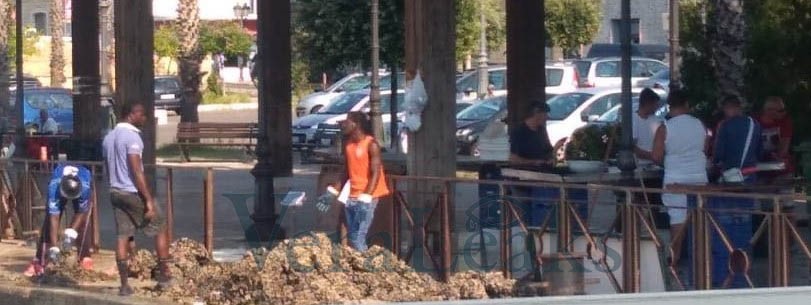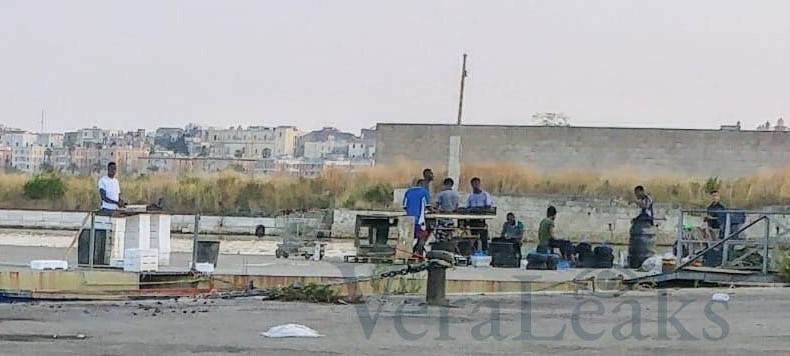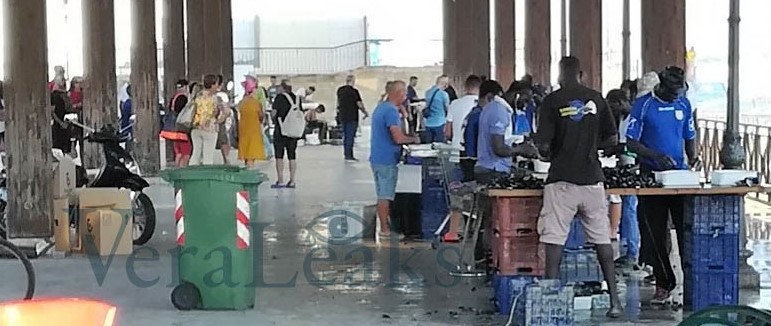11 August 2018 – by Luciano Manna, translated by Alessia Melchiorre
Refugees in Taranto have been employed for more than one year to do the handling, the cleaning, the opening and the packaging of the mussels from the illegal and unauthorised cultivations; these mussels are grown in stretches of water where they receive high levels of dioxin and PCB beyond the limits of the law. Moreover, in some cases, they are cultivated with makeshift means, such as simple ropes pulled down in the sea among the moorings of the boats, instead of the traditional structures. The zones where the foreigner labourers work are: the fish market, Piazzale Democrate and Via Garibaldi.

Refugees employed in the production chain of mussels at Piazzale Democrate at 9 am on the 10th of august 2018
As already reported to the public prosecutor of Taranto and also published in the article “The illegal production chain of Taranto’s mussels”, the first inlet of the Little Sea of Taranto represents the illegal basin where noxious mussels are sold to both the unauthorised and regular markets – in addition to the stands on the walkways or the fish shops – in Taranto as well as other regions in Italy, where the mussels are sorted with a different traceability. It is clear that this illegal trade is controlled by criminal organisations, where the names of the actors who manage the cooperatives of the fish industry are well known; these companies can invest dirty money in the first inlet, and therefore launder it, while earning even more, without paying any taxes. In addition, the mussels of the first inlet of the Little Sea, being polluted, are sold in the regular markets for the lower prices: 0.30 cents per kilo and then resold for 1/1.30 euro per kilo. So far in 2018, thousands of tonnes of noxious mussels have been sold in the regular market of Taranto, in other cities in Puglia, in other regions of Italy and even abroad. How much is worth the first inlet of the Little Sea of Taranto for the criminal organisations? A few millions of euros.

Extracomunitari Refugees employed in the production chain of mussels at the fish market, august 2018
But the whole system in the local market needs cheap labour; therefore, we have been monitoring this system for several months now and found out that tens of refugees are enrolled in this illegal production chain. Which are the figures? About a hundred of kids are allocated between Via Garibaldi (Garibaldi’s Street), Piazzale Democrate and the fish market to clean and open the mussels for 10 hours per day, earning around 5-10 euros to produce each around 50/60 bowls of mussels. The bowls are sold for 1.80 euro. In the best-case scenario, that is when they worked 10 hours and earned 10 euros, they get 1 euro per hour, but that is not always the case. When the production of the bowls full of clean mussels needs more rapid rythms imposed by the bosses of the stands, the kids ask help to their friends, with whom they split the pay: 5 euros each.

Refugees employed in the production chain of mussels at Piazzale Democrate at 6 pm of the 10th of August 2018
